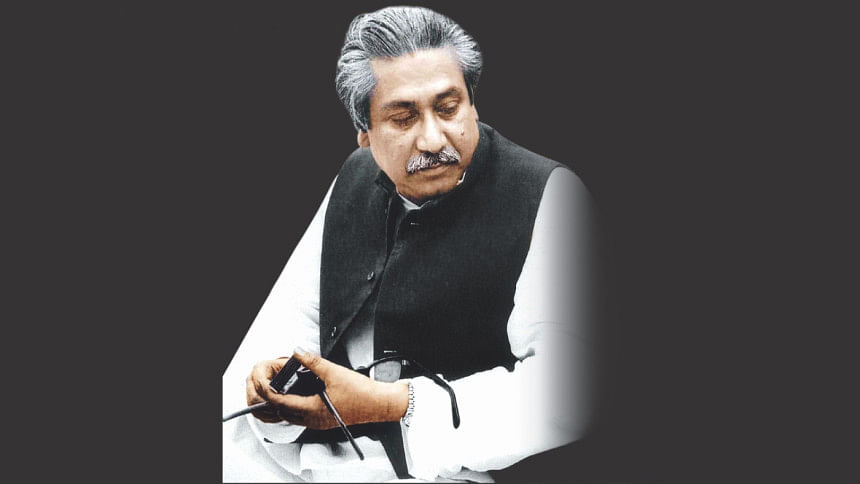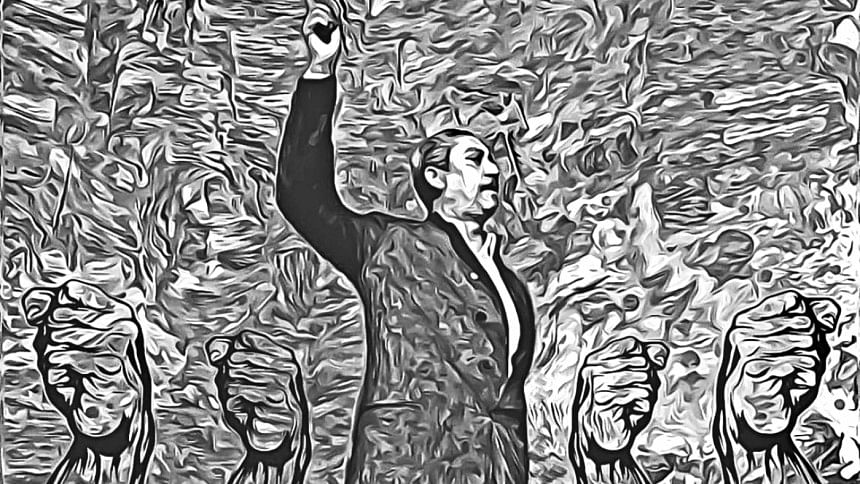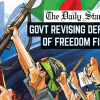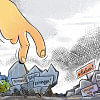Bangabandhu in prison: Transcending stone walls and iron bars

"Stone walls do not a prison make,
Nor iron bars a cage." – Richard Lovelace, "To Althea, from Prison"
Quite a few famous books have been written either in prison and/or about prison life. One thinks of the English puritan John Bunyan's 1678 allegorical book The Pilgrim's Progress which begins with an account of his imprisonment. Somewhat closer to us in time is Mahatma Gandhi's 1932 work, My Experiments with Truth, in which he ruminates on his role in the Indian movement towards independence; it was written while he was in a Pune prison. Even closer to us in time is Nelson Mandela's book written over 27 years—Conversation with Myself (2010). It consists of articles and interviews dealing with his years of imprisonment and makes us aware of his thoughts and experiences relating to his involvement with the movement against apartheid.
To these important and stirring books, which reflect minds that are indomitable, as well as movements that have had a lasting impact on world history, we must add the two prison books written by Bangabandhu Sheikh Mujibur Rahman. The first of these works is Oshomapto Attojiboni (written probably between 1966 and 1969 and possibly sometime "in the second half of 1967 during his imprisonment at Central Jail, Dhaka," p. 295; all page references are to the OUP edition); it has been translated into English as The Unfinished Memoirs (2012). The second is Karagarer Rojnamcha, based on five notebooks written in English between 1958 and 1969; these have been translated into English and brought under one cover as Prison Diaries (2018). What follows is an analytical account of these two books, prefaced by a summary account of his years in prison.
Bangabandhu spent almost one-fourth of his nearly 55 years of life in prison. The first time he went to jail was when as a schoolboy, in his hometown of Tungipara, he and some of his friends got into a fight with Hindu leaders who had beaten up a Muslim one. On this occasion, he spent seven days in prison. But he was taken to a jail in East Pakistan for the first time on March 11, 1948 when he was agitating with other students against the West Pakistani move to make Urdu the only state language of Pakistan. He was in prison for a much longer period when he was arrested once more in October 1949 for leading anti-government protests in East Pakistan which had gathered considerable momentum by this time. He would be released on this occasion at the end of February 1952. There was another six-month-long period of incarceration for him in 1954 after the dismissal of the Jukto (United) Front government of which he was a minister, because of actions taken against its members by the Pakistani central government.
Bangabandhu had to spend 14 months in prison from October 1958 after General Ayub Khan imposed martial law in Pakistan in 1958. He was imprisoned yet again in February 1962, if only for a short while on this occasion. Two weeks before the 1964 elections held by Ayub Khan to legitimise his rule, Bangabandhu was jailed once more, this time for 14 days. There was another period of jail life for Bangabandhu in 1965. In 1966, when he spearheaded the Six-Point Movement for the complete autonomy of East Pakistan, he was imprisoned still again, this time for more than two years on trumped up charges framed by the Pakistani intelligence people in the so-called "Agartala Conspiracy" case. Released on February 23, 1968, Bangabandhu galvanised public opinion and led the Awami League to an overwhelming victory in the national elections held in December 1970.
Nevertheless, on March 26, 1971, he was arrested yet again and taken to a prison in West Pakistan. He was released for the last time from a Pakistani prison on January 8, 1972, soon after the birth of Bangladesh. He was then able to come back to the land that he had led to independence in a movement that, in hindsight, we can see had been going on for decades and had been developing inevitably towards its climax with the liberation of Bangladesh. Whether inside or outside the many prisons he had been incarcerated in, Bangabandhu had always been steering his beloved Bangladesh to freedom, undeterred by the stresses and physical discomfort he had suffered in captivity, learning all the while from the experience about the value of civil resistance and the importance of holding on to one's ideals in the face of oppression and even bodily pain.
According to Mr Tofail Ahmed, one of the four young men who had led student politics during the movement for Bangladesh, and someone who later became commerce minister of Bangladesh, Bangabandhu served a total of 4,682 days in prison. In other words, almost 13 of his 55 years of life were spent in prison. But there were other occasions when he had been interned briefly or was trying to evade internment. Indeed, threats of imprisonment when he was outside jail and thoughts of continuing incarceration when he was in it were recurring aspects of this Bengali political leader's life till he became prime minister of Bangladesh in 1972.
How did Bangabandhu view the prospect of endless imprisonment, the seemingly unending days and months and years he spent in Pakistani prisons, and the possibilities of freedom that were dangled before him and then taken away again and again? Variously, of course! Because he was of the type who would never compromise; he knew full well that he was doomed to be in prison longer than many other political prisoners of his time. But while at times he was depressed by sentences that seemed to have no end or justification, on other occasions he was exhilarated by the feeling that his sacrifice and that of others interned like him was not in vain; indeed, he came to believe gradually that such sacrifices were inevitable if Bangladeshis were to free themselves fully and irrevocably from tyrannical Pakistani regimes and autocratic rulers as well as their East Pakistani lackeys.
Fortunately for us, on quite a few occasions while in prison, Bangabandhu left behind his impressions of jail life and the feelings incarceration stirred in him by writing them down in a number of diaries and scrap/notebooks he had with him or were given then. Writing when in prison became for him a compulsive act where he could pour his thoughts and observations about prison life, politics and politicians into the writing material he had on hand. It was also a way of coping with solitary confinement, since from sunset to sunrise he was quite often jailed in cells where his only companions were his thoughts.
Thanks to the promptings of his wife, who, as we learn from the memorable opening paragraph of The Unfinished Memoirs (2012), urged him to "write about his life in jail" and left him some notebooks for the purpose in prison, and thanks also to the way she and her daughters tried to protect the notebooks from raids and from oblivion time after time, the diaries and notebooks have now been preserved for posterity forever. In particular, because of the care and dedication of our present prime minister in seeing the books into worldwide publication, people are now in a position inside and outside Bangladesh to tap the rich vein of information this book and the Prison Diaries (2018) contain about Bangabandhu's time in prison, his thoughts there, the encounters with people and unforgettable experiences he had then, and the vision he nurtured for the future of Bangladesh even in the dark days of confinement and isolation from others.

Unfinished Memoirs: The making of the "Father of the Nation" and the difficult path to freedom
In March 1948, the first time Bangabandhu had to spend a few days in a Pakistani prison (along with Bahauddin Chowdhury) due to his involvement in the movement against the imposition of Urdu as the only state language of Pakistan, he displayed abundantly his courage and leadership. The duo had decided then to take the brunt of the assault they apprehended would be directed at them, although at the end the Bengali prisoners they were leading were spared physical punishment. However, this initiation into prison life in Pakistan led him to recognise the necessity of knowing the laws regarding internment of prisoners and learning how to cope with imprisonment and those imposing the prison sentence.
In April 1949, Bangabandhu opted to go to jail because it was widely believed by many student leaders that his going to jail would "give the language movement a boost." This was going to be Bangabandhu's first sustained experience of prison life. Because he was with scores of other activists who had been interned with him and also because of a sympathetic warden, on this occasion prison life was not that trying for the initial period. However, in his village home, his wife and his parents soon became upset at an incarceration that would go on and on. But when his companions were released after a few months and he found himself in jail with only one of his fellow activists, the young Mujib realised fully, perhaps for the first time, "how painful imprisonment could be." Moreover, he kept thinking of the course the language movement was taking outside. His thoughts were fed by news of the political situation that trickled into the prison or by the newspapers he had access to in confinement.
Released eventually, Bangabandhu got involved in organising the Awami Muslim League, which was then in a nascent state. Inevitably, given his indomitable spirit, energy, activism and aggressive oppositional stance, he was going to be in prison again towards the end of 1949. Clearly, the Pakistanis were beginning to realise the extent of the threat he was beginning to pose to their autocratic, pro-West Pakistan policies. On this occasion, he would be in prison for a relatively long period and would experience the travails of being in solitary confinement for the first time. But during daytime, when he was allowed to mix with the other prisoners, he came to know prison life well and got to know all sorts of prisoners well too. He also learnt now of the deprivations that came with being in prison, the desperation that beset far too many prisoners after a while, and the anguish of separation that would lead many of them to depression.
Bangabandhu was also beginning to understand on these occasions how arbitrary justice could be. Thus though he would be acquitted in one case brought against him towards the end of 1950, he would soon find out that another case had been filed against him in Gopalganj! Obviously, he wouldn't be allowed to walk out of prison anytime soon. Clearly, too, the Pakistani rulers of the time were bent on keeping him there as long as possible any which way they could.
In these trying times, Bangabandhu tried to cope with prison life as fearlessly as he was able to. Mr Shamsul Haq, his fellow political prisoner, had turned intensely religious to ward off the demons of a prisoner seemingly doomed to be within a cell forever. Mr Haq soon developed symptoms of insanity. Bangabandhu, in contrast, tried to help his prison mate and close ally as best as he could and turned to things like gardening to keep his mind preoccupied. Whenever he could, he chatted with his fellow prisoners. Moreover, he tried to keep himself informed about developments in politics outside the prison walls as well as he could, either by reading the newspapers he had access to, or by talking to people he would meet inside it.
When Bangabandhu came across prisoners who had been hauled in after the Hindu-Muslim riots in Dhaka in 1950, he even counselled the rioters not to persist in this line of action, pointing out to them that "it wasn't right to get involved in rioting and the killing of people; it was, in fact, a sin to kill innocent people. A true Muslim couldn't kill anyone who was blameless; God and his Prophet had forbidden such action." Here, as when he was outside, his positive views and leadership qualities attracted his fellow prisoners to him. They would always end up revealing their obvious pleasure in his company and would respect him for his views. Many of them would confide in him and seek his counsel. The consequence soon was a decision by the powers that were to isolate him from others and give him a solitary cell! However, even the warden and other Bengali jail personnel began to treat him with respect after a while.
At the end of 1950 Bangabandhu was acquitted of the charges brought against him. Nevertheless, the Pakistani administration and their East Pakistani lackeys immediately found new reasons to confine him. The only concession given to him was to grant him "division" status at this time. But he had another case filed against him soon enough—this time in Gopalganj. This move made his captors take him to the district town and back again repeatedly. The journey proved to be mentally and physically trying. Nevertheless, in Gopalganj he was treated to the spectacle of seeing himself welcomed by the locals as a hero instead of the conspirator/agitator the West Pakistanis and their East Pakistani collaborators had made him out to be.
The endless nights spent in isolation and in darkness were certainly frustrating for Bangabandhu. This sort of torture inflicted on him went on in violation of the jail code which specified that "no prisoner should be allowed to stay in solitary confinement for more than three consecutive months." The continuous movement back and forth from Dhaka to Faridpur to Gopalganj strained him immensely as well. The sight of his aged parents, his ever-suffering and devoted wife, his young daughter, "who wouldn't let go of me," and his little son, who couldn't even acknowledge him as his father initially, were things he describes in The Unfinished Memoirs, at times without further comment, only to leave the reader with the distinct feeling that the emotions aroused in him on such occasions were far too deep for words.
At one point, Bangabandhu petitioned the administration to take him to prison elsewhere so that he could report to the Gopalganj courthouse without the arduous journey he would have to undergo from Faridpur time and again. But the solution offered—Khulna Jail—proved to be even worse as an option since conditions in this particular prison proved to be far more dismal. His health began deteriorating here. The living conditions inflicted on him were totally depressing. He was released on bail at one point by the Gopalganj court only to be imprisoned again on another trumped up charge.
Though 18 months of captivity had gone by, Bangabandhu's ordeal on this occasion was far from over. When he pointed out to his jailers that he was being held without a reason, he was set free, only to be imprisoned one more time. Now he was taken to Faridpur Jail where he would have to share a room with a few other political prisoners. His health deteriorated even more here. The other political prisoners around him attempted to nurse him back to health. But when nothing seemed to be working, he was sent to Dhaka Jail so that he could get better treatment. From here he was taken to Dhaka Medical College, where he would be under fulltime professional care.
Bangabandhu's stay in Dhaka Medical College coincided with the movement that was gathering momentum throughout East Pakistan because of the speech given by Prime Minister Khawaja Nazimuddin to the effect that Urdu would become the only state language of Pakistan. Although under police watch, Bangabandhu managed to direct Student League leaders who had met him in the hospital to form a united front with other parties that could launch a movement against the "one state language" policy of the central government. Later, he even met leading members of such parties who managed to come to his cell. They then decided to "observe 21 February as State Language Day…and form a committee that day to conduct the movement to establish Bengali as a state language."
The government now had to contend not only with the burgeoning Language Movement but also the resistance Bangabandhu and his fellow prisoner Mohiuddin posed from within the jail through their acts of nonviolent resistance. The arms of the law had physically bound them inside, but their minds were free and insurgent. It was obvious that Bangabandhu had made up his mind to resist till the end. As he put it in his book, "I would force myself out of jail either alive or dead." In desperation, the Pakistani administration took him away from Dhaka to Faridpur, along with Mohiuddin, where they went on a hunger strike till death. The jailers here tried to force feed them. His condition deteriorating fast, Bangabandhu prepared himself for death, writing farewell letters to his father, his wife, his mentor Mr Suhrawardy and Maulana Bhashani.
At this critical point, the news of what had happened in Dhaka on the fateful day of February 21 was soon followed even in the district town with protests, processions and civil resistance. In the next few days, the political situation outside the jail worsened; inside it, Bangabandhu and Mohiuddin came closer and closer to death. Relenting, as things appeared to go totally out of control, the Pakistani government officials were forced to release them and concede to the demonstrators' demands. Henceforth, Urdu would not be made the only state language of Pakistan and would have to share the status with Bengali! As Bangabandhu put it in retrospect in The Unfinished Memoirs, "I began to believe that no one could shut us up any more."
However, Bangabandhu would be jailed again in 1954, soon after the United Front, of which he was a prominent member, soundly defeated the Muslim League in the elections held in East Pakistan. The closing pages of The Unfinished Memoirs thus describe the machinations of a central government bent on dismissing an elected and popular provincial one and putting its leaders behind bars, and the strategy Bangabandhu and his party members were going to adopt against the move to dislodge them from power. The ending of The Unfinished Memoirs is inexplicably abrupt; perhaps action had been taken to prevent him from writing anymore.
But it is our great fortune that the manuscripts of The Unfinished Memoirs and the Prison Diaries have survived and have been preserved for posterity. The first book, with which this paper deals, is now, of course, widely available in Bengali and in an English version but also has been translated into several major languages of the world. As an autobiography, it is remarkable as a narrative of the growth of the mind and the firming of the spirit of a man who would lead his people to freedom; as a prison book it is clear proof of how "stone walls do not a prison make/or iron bars a cage"; as evidence of the folly of its captors who thought that strong-arm tactics would cripple Bangabandhu's spirit and prevent him from playing a part in the Bengali resistance against authoritarian rule imposed by the West Pakistani rulers and their lackeys, it is a powerful account of civil resistance. It reminds one distinctly of the father of nonviolent resistance, Henry David Thoreau, and his assertion in "Resistance to Civil Government" (also known as "Civil Disobedience") that the mind cannot be confined by any arbitrary or coercive measures or by stone walls. But one is also reminded of Gandhi's declaration, "You can chain me, you can torture me, you can even destroy this body, but you will never imprison my mind," and of Nelson Mandela's contention, "There is no easy walk to freedom anywhere."
Prof Dr Fakrul Alam is UGC Professor at the University of Dhaka and the translator of The Unfinished Memoirs and Prison Diaries.

 For all latest news, follow The Daily Star's Google News channel.
For all latest news, follow The Daily Star's Google News channel. 








Comments